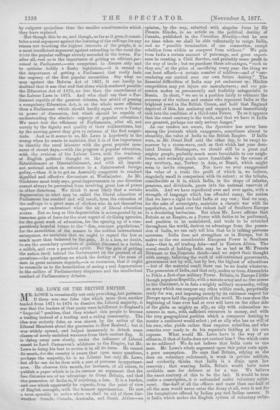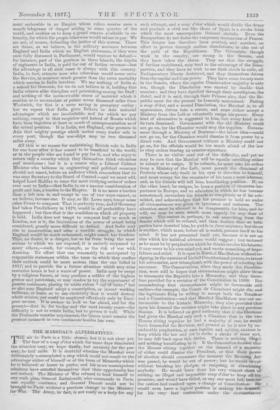MR. LOWE ON THE BRITISH EMPIRE.
MR. LOWE is occasionally not only provoking, but perverse. If 'there was one false idea which more than another tended from 1871 to 1874 to dissolve the Liberal majority, it was that the leaders of that party were indifferent to England's "Imperial" position, that they wished this people to become a trading instead of a trading and a ruling community. The idea was entirely false, as was shown by the action of the Liberal Members about the guarantee to New Zealand ; but it was widely spread, and helped immensely to detach some classes of newly enriched waverers from their ancient flag. It is dying away now slowly, under the influence of Liberal assent to Lord Carnarv on's additions to the Empire, but Mr. Lowe is doing his best to revive it in all its force. He cannot do much, for the country is aware that upon many questions, perhaps the majority, he is no Liberal but only Mr. Lowe, but all he can do he does with a sort of perverse inopportune- ness. He chooses this month, for instance, of all others, to publish a paper which is in its essence an argument that the free Colonies are of no advantage to Great Britain, and that the. possession of India is, if anything, a loss. It is a burden, and one which apparently he regards, from the point of view of English strength, with the keenest apprehension. He sees a term speedily to arrive when we shall be rid cif those f air- weather friends, Canada, Australia, and South Africa—an ' opinion, by the way, rebutted with singular force by Sir Francis Ilincks, in an article on the political destiny of Canada, published in the Canadian Monthly—but he sees no time when we shall be able voluntarily to resign India, and no "possible termination of our connection, except rebellion from within or conquest from without." We gain from India a certain amount of patronage, and great experi- ence in creating a Civil Service, and probably some profit in the way of trade ; but we purchase these advantages, "such as they are," at the price of sacrificing every year the thing we can least afford—a certain number of soldiers—and of "sur- rendering our control over our own future destiny." The financial difficulties of India may yet embarrass us; Hindoe competition may yet injure our manufactures ; and our pos. session makes us permanently and foolishly antagonistic to Russia. In short, "we are in a position fairly to estimate the accuracy of the writers and orators who represent India as the brightest jewel in the British Crown, and hold that England deprived of this, her mainstay and support, must immediately sink into the condition of a third-rate Power. To us it appears that the exact contrary is the truth, and that we have in India our greatest, perhaps our only serious danger."
As our readers are aware, the Spectator has never been among the journals which exaggerate, sometimes almost to absurdity, the value of India to the British Empire. If India were, as Mr. Grant Duff said the other day, to be swept to- morrow by a storm-wave, such as that which last year deso- lated Deccan Shabazpore, we should still be a great and mighty people, probably much more formidable to our neigh- bours, and certainly much more formidable to the owners of any territory, say, Turkey in Asia, or Brazil, which might seem to invite conquest. Nor have we ever exaggerated the value of a trade the profit of which is, we believe, singularly small in comparison with its extent ; or the tribute, considerable as it is, which India, in the shape of salaries, pensions, and dividends, pours into the national reservoir of wealth. And we have repudiated over and over again, with a strength of language which has offended many, the notion that we have a right to hold India at any cost ; that we may, for the sake of sovereignty, maintain a chronic war with its population, or hand over the richest half of Southern Europe to a desolating barbarism. But when Mr. Lowe affirms that Britain as an Empire, as a Power with duties to be performed, and position to be maintained, and trade to be extended throughout the world, derives no advantage from the posses- sion of India, we can only tell him that he is talking perverse nonsense. India does not strengthen us in Europe, but it makes us the one considerable European Power in Southern Asia—that is, all trading Asia—and in Eastern Africa. The moral result of holding India may be as bad as Mr. Francis Newman or theSomtists think—and we reject their thought with energy, believing the work of self-restrained government, government not by will, but by law, the highest of educations —but of the material result there can be no doubt whatever. The possession of India, and that only, makes us from Alexandria to Pekin a first-class military Power. Britain, in Europe little though populous Republic, with a minute army and no free access to the Continent, is in Asia a mighty military monarchy, ruling an army which can conquer any other within reach, perpetually ready for war, and imposing merely by its existence respect for Europe upon half the population of the world. No race since the beginning of time ever had or ever will have on the other side of the globe so mighty an ally, an ally with exhaustless re- sources in men, with sufficient resources in money, and with the very geographical position which a conqueror desiring to master a continent would select ; yet an ally who has no will of his own, who yields rather than requires subsidies, and who remains ever ready to do his superior's bidding at his own expense. What would Mr. Lowe have in the way of an alliance, if that of India does not content him? One which costs us no soldiers ? We do not believe that India costs us one man. Mr. Lowe's whole argument upon this point rests upon a pure assumption. Ile says that Britain, relying as she does on voluntary enlistment, is weak in private soldiers, and evidently thinks that India is a drain upon her reservoir ; that wanting India, Britain would have more available men for defence or for a war. We believe the exact contrary of this to be the fact. It would be true under a conscription, it is unfounded under voluntary enlist- ment. One-half of all the officers and more than one-half of all the men would never enter the Army at all, were it not for the temptations offered by Indian pay and Indian careers. It is India which makes the English system of voluntary enlist-
meat endurable in an Empire whose rulers receive once a month telegrams of danger arising in some quarter of the world, and enables us to keep a grand reserve available in ex- tremity, for which the people otherwise would refuse to pay. We are not, of coarse, defending the justice of this system. There are items, as we believe, in the military accounts between England and India which no English statesman, if they were once fully discussed in Parliament,. would venture to defend— for instance, part of the garrison in these Islands, the depots of regiments in India,. is paid for out of Indian revenue—but the advantage in all such cases is always with this country. India, in fact, attracts men who otherwise would never enter the Service, in numbers much greater than the extra mortality which service in India involves. We say nothing of India as a echool for Generals, for we do not believe in it, holding that India relaxes alike discipline and painstaking among the Staff ; and nothing of the inconceivable stores of materiel which it enables us to accumulate at points seven thousand miles from Woolwich, for that is a mere saving in pecuniary outlay ; but we repeat that India gives Britain in Asia material advantages which are incalculable, and for which we pay nothing, except in that suspicion and hatred of Russia which have been begotten at least as much of misrepresentation as of the actual position. It is India, not England, who protects in Asia that mighty prestige which makes every trader safe in every port, though the war-ships may be two thousand miles away.
All this is no reason for maintaining British rule in India for one hour after it has ceased to be beneficial to the world, or to the people who are found to pay for it, and who enjoy in return only a security which they themselves think colourless and wearisome ; but it is a reason why a Liberal Cabinet Minister who believes in engineering and political economy should not assert, before an audience which remembers that he was once Secretary to the Board of Control—and we must add, helped Lord Halifax to issue the most vivifying series of orders ever sent to India—that India is, on a narrow consideration of profit and loss, a burden to the Empire. It is no more a burden than a left arm is, and except in one of two ways cannot, as we believe, become one. It may, as Mr. Lowe says, tempt some other Power to conquest. That is perfectly true, and if Germany had taken Pondicherry in 1870, would in all probability have happened ; but then that is the condition on which all property is held. India does not tempt to conquest half so much as London, nor is it, the limitations of the power of attack being considered, greatly more difficult to defend. And India may rise in insurrection, and after a terrible struggle, in which England would be much exhausted, might assert her freedom. That, no doubt, is a danger, but so far from being the most serious to which we are exposed, it is entirely surpassed by many others,—such, for example, as the risk of war with America. No effort that can reasonably be anticipated by responsible statesmen within the term to which they confine their outlook could be more serious than the one foiled in 18,57, and to provide for a future situation which may, arise centuries hene,e is but a waste of power. India may be- swept by a religious furore, or may produce a soldier of the highest genius and patriotism, or may resolve to try the experiment of passive resistance, placing its white rulers 44 out of caste ;" but so also may England adopt a conscription, or invent working balloons, or learn so to use electricity that it would destroy whole armies, yet could be employed effectively only by Euro- pean silvans. It is useless to look so far, ahead, and for the presciat--that is, for to-day and the next twenty yearsthe difficulty is not to retain India, but to govern it well. While the Peninsula remains acquiescent, the Queen must remain the greatest monarch in two continents besides her own.



































 Previous page
Previous page